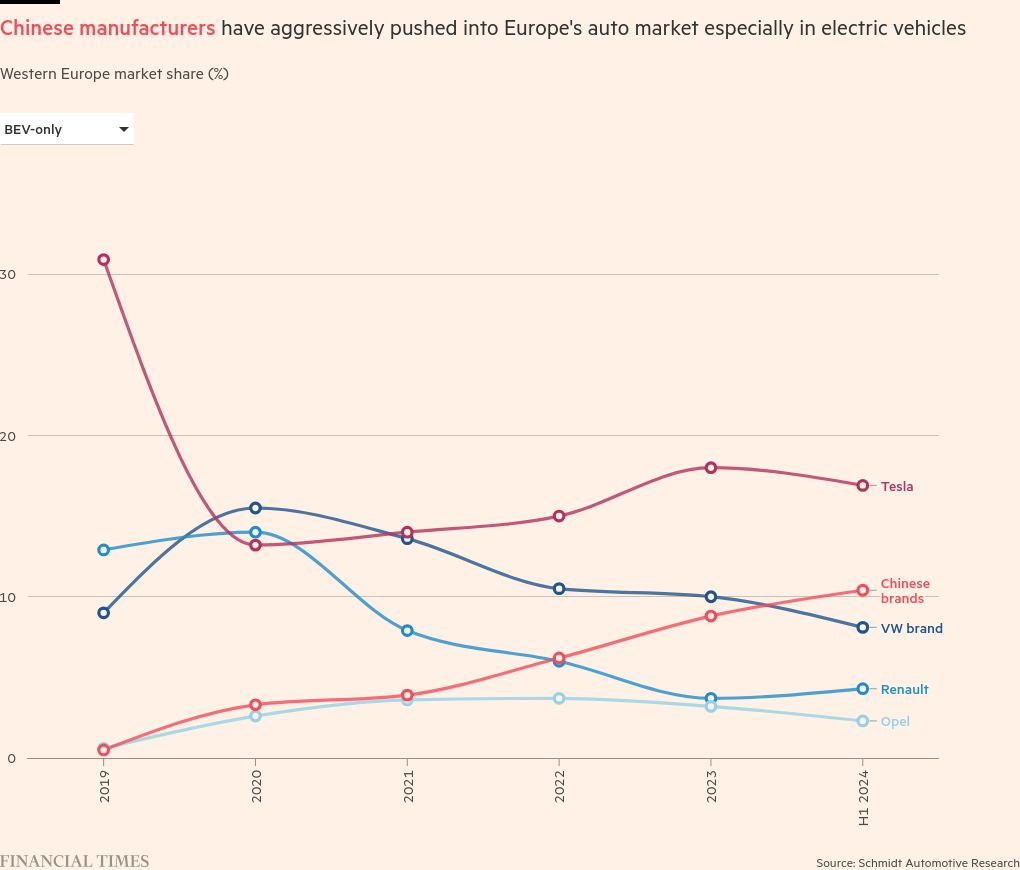
This article is an on-site version of our Europe Express newsletter. Premium subscribers can sign up here to get the newsletter delivered every weekday and Saturday morning. Standard subscribers can upgrade to Premium here, or explore all FT newsletters
Good morning. A scoop to start: Brussels is making plans to go it alone without the US in issuing a loan of up to €40bn to Ukraine, after Hungary refused to budge on a sanctions overhaul that Washington has demanded to secure its participation.
Today, our parliament correspondent previews this morning’s reveal of the next slate of European commissioners, and our eastern Europe team report on the region’s deadly floods.
Commissioned
Ursula von der Leyen will present her new commissioners today. Interest is bound to switch from the personalities to the portfolios — which will signal what the most powerful European Commission president since Jacques Delors wants to prioritise in her second term, writes Andy Bounds.
Context: The 27 commissioner candidates are still not finalised. France changed its pick yesterday, and the Slovenian parliament is still squabbling over its nominee. But von der Leyen’s sway is such that she will probably get her way no matter what.
France’s Thierry Breton, the biggest thorn in her side, was abandoned by President Emmanuel Macron in favour of the more collegiate Stéphane Séjourné in a last-minute backroom deal. Breton claims von der Leyen dangled a more important portfolio to prompt the Elysée’s desertion.
“I can’t recall another commission president who could strong-arm the French president,” said an EU diplomat.
Séjourné, from the liberal Renew group, will probably get a vice-president’s role in the new commission. He is expected to be joined by the Spanish Socialist Teresa Ribera, Italy’s Raffaele Fitto of the hard-right European Conservatives and Reformists, Valdis Dombrovskis from von der Leyen’s European People’s party, and the non-aligned Maroš Šefčovič of Slovakia.
But no one will have the independence of Frans Timmermans, the Socialist Dutch climate commissioner who led the Green Deal climate package; or Margrethe Vestager, the Liberal Danish competition commissioner who took on Apple and Google.
The majority of new commissioners are to come from von der Leyen’s own party, the EPP. “Dissent doesn’t seem to be welcome in the commission’s upper echelons,” said a staffer from another party.
Von der Leyen will create new portfolios for defence, competitiveness and housing, as she switches from going green to going for growth.
Her only obstacle now is the parliamentary hearings. Each commissioner-designate will get a grilling from a committee, probably in October, and needs support of two-thirds of the committee members. Tradition demands that two or three candidates are rejected as lawmakers flex their muscles.
Then a straight majority vote follows for the entire commission in plenary. The Greens and Socialists have said they could vote against — von der Leyen may yet have to swap the stick for the carrot.
Chart du jour: Die Autostadt

Volkswagen’s plan to close some of its German factories has shaken the city of Wolfsburg, where many inhabitants work for the carmaker. “There would be no Wolfsburg without Volkswagen,” says one longtime employee.
Open water
Exceptionally heavy rains have devastated parts of central and eastern Europe, claiming over a dozen lives and causing mass evacuations, write Marton Dunai and Raphael Minder.
Context: Since the weekend, storm Boris has brought intense rain, burst dams and wreaked havoc in countries including Poland, Czech Republic, Austria and Romania. Hundreds of thousands of people have evacuated their homes, and some governments have deployed their military to help with the rescue efforts and reinforce river banks.
Some towns on either side of the border between Poland and the Czech Republic have been submerged, as well as in eastern Romania. Parts of Vienna and Bratislava, both on the Danube, were also flooded, with authorities warning that river levels could rise further.
The total death toll has risen to at least 16 — including an Austrian fireman who was part of the rescue efforts — and is expected to increase further. Czech authorities said yesterday that seven people were still missing.
Romanian President Klaus Iohannis said that this latest natural disaster showed that “we are again facing the effects of climate change, which are increasingly present on the European continent, with dramatic consequences”.
In Poland, Prime Minister Donald Tusk announced that 1bn zloty (€235mn) would be allocated for victims, while Warsaw will also ask for EU emergency funding.
Hungarian Prime Minister Viktor Orbán cancelled a trip yesterday to Strasbourg to speak at the European parliament, depriving it of a much expected showdown with Hungarian opposition leader Péter Magyar, who cancelled as well.
Orbán called off all his international trips this week, including to New York and the Vatican, “due to the extreme weather conditions and the ongoing floods in Hungary”, he wrote on X.
What to watch today
-
European Commission president Ursula von der Leyen presents her new college of commissioners in Strasbourg.
-
EU chief diplomat Josep Borrell is in the United Arab Emirates.
-
German foreign minister Annalena Baerbock travels to Moldova.
Now read these
Recommended newsletters for you
Trade Secrets — A must-read on the changing face of international trade and globalisation. Sign up here
Swamp Notes — Expert insight on the intersection of money and power in US politics. Sign up here
Are you enjoying Europe Express? Sign up here to have it delivered straight to your inbox every workday at 7am CET and on Saturdays at noon CET. Do tell us what you think, we love to hear from you: [email protected]. Keep up with the latest European stories @FT Europe